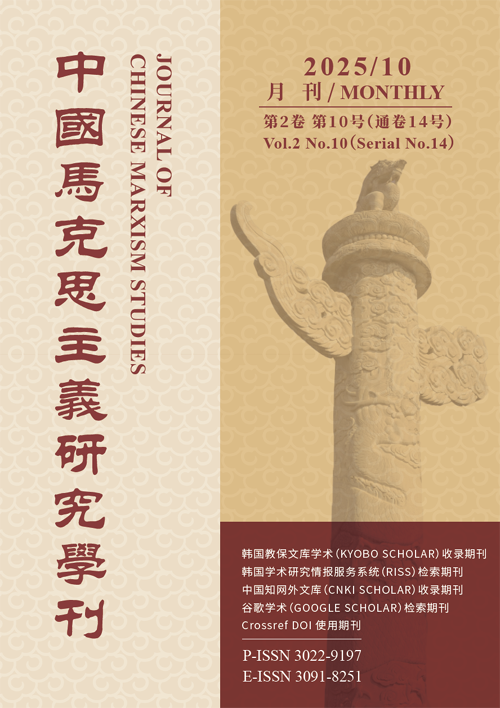- 영문명
- The Critique of Political Economy in Marx’s Emancipation Thought: Taking Zur Judenfrage as a Study Text
- 발행기관
- YIXIN 출판사
- 저자명
- Xiang Qianmin
- 간행물 정보
- 『Journal of Chinese Marxism studies』Vol.2 No.10, 1~11쪽, 전체 11쪽
- 주제분류
- 사회과학 > 교육학
- 파일형태
- 발행일자
- 2025.10.31
4,120원
구매일시로부터 72시간 이내에 다운로드 가능합니다.
이 학술논문 정보는 (주)교보문고와 각 발행기관 사이에 저작물 이용 계약이 체결된 것으로, 교보문고를 통해 제공되고 있습니다.

국문 초록
Marx expounded his emancipation thought with a large number of words in Zur Judenfrage. When discussed political liberation, Marx was from two perspectives, that are political alienation and the relationship between religion and the state, to inspect the inherent defect of political liberation movement, that was, the human rights paradox that modern political countries were difficult to reconcile, and put forward that political liberation was only a intermediate link for achieving real liberation. Hence, to explore a new way to achieve real liberation on the basis of criticizing modern human rights was a sure choice. When talked about human liberation, Marx explained that broken the dichotomy between civil society and modern state, promoting the “reconciliation” between modern state and civil society, and realizing the unity of universality and particularity were resultful ways to achieve liberation. When talked about social liberation, Marx deeply elucidated that the final step to achieve liberation is to sublating alienated labor and to abolishing the legitimacy of private property, and then get rid of the domination of the fetishism for money. In other words, Marx's liberation thought had a distinct implication about political economy criticism. Such thought not only discussed the survival state of the Jewish nation, but also talked about the future of the whole human destiny, which demonstrates the “class” feature of Marx’s emancipation thought as well as to answer why the Communist Party of China has a strong “class” feeling.
영문 초록
马克思在《论犹太人问题》中较大篇幅地阐发解放思想。在论及政治解放时,马克思从政治异化、宗教与国家的关系二维度揭示政治解放运动的内在缺陷,即现代政治国家存在难以调和的人权悖论,表明政治解放只是实现真正解放的中间环节,必须在批判现代人权的基础上探寻一条达至真正解放的道路。在论及人的解放时,马克思阐明打破市民社会与现代国家间的二分对立状态,促成现代国家与市民社会二者间的“和解”,以及实现普遍性与特殊性的统一,是实现人的解放的科学路径。在论及社会解放时,马克思阐明扬弃异化劳动,取消私有财产的合法地位,进而摆脱货币拜物教的支配是实现解放目标的最后一环。马克思的解放思想葆有鲜明的政治经济学批判意蕴。这一解放思想不仅探讨犹太民族的生存问题,也探讨全世界人民的命运走向,既彰显马克思解放思想的“类”特征,又回答中国共产党缘何葆有强烈的“类”情怀。
목차
Ⅰ.引言
Ⅱ.政治解放与现代政治国家的人权悖论
Ⅲ.现代国家和市民社会的“和解”与人的解放
Ⅳ.社会解放与私有财产合法性地位的消敉
Ⅴ.结语
参考文献
해당간행물 수록 논문
- Journal of Chinese Marxism studies Vol.2 No.10 Contents
- 马克思解放思想的政治经济学批判——以《论犹太人问题》为考察文本
- 马克思主义自我革命思想的生成渊源、理论结构与当代启示——以《共产党宣言》文本为中心的考察
- 马克思恩格斯“消灭家庭”思想的基本内涵及当代启示
- 数字资本主义时代技术应用异化现象审视
- 中央苏区时期青年群体的政治角色重塑机制及其历史经验探析
- 毛泽东诗词中伟大建党精神的意蕴及时代价值
- 新时代加强非公企业党建的主体动因、现实难题与优化思路
- 中国式现代化的认识论意蕴
- 新时代铸牢中华民族共同体意识的话语嬗变研究
- 基层治理现代化视域下全过程人民民主的实践困境与路径研究
- 交往实践重构与乡村文化现代性转型——基于马克思社会交往理论的分析
- 促进人民精神生活共同富裕的价值旨趣——基于物质文明与精神文明相协调视角
- 文化主体性构建的时代意蕴、内在根基和实践路径
- “第二个结合”与中国式现代化价值观的建构逻辑
- 论习近平文化思想与中华优秀传统文化的关系
- 新媒体赋能红色文化传播:价值意蕴、挑战剖析与策略分析
- 文艺精品赋能新时代高校思政育人实践研究
참고문헌
교보eBook 첫 방문을 환영 합니다!

신규가입 혜택 지급이 완료 되었습니다.
바로 사용 가능한 교보e캐시 1,000원 (유효기간 7일)
지금 바로 교보eBook의 다양한 콘텐츠를 이용해 보세요!



